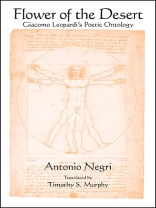A profound meditation on Leopardi’s art and thought as well as a reframing and reassertion of Negri’s own philosophical and political project of liberation.
Antonio Negri, one of Italy’s most influential and controversial contemporary philosophers, offers in this book a radical new interpretation of the nineteenth-century Italian poet Giacomo Leopardi. For Negri, Leopardi is not the bitter, idealistic individualist of conventional literary history, but rather a profoundly materialist thinker who sees human solidarity as the only possible solution to the catastrophes of history and politics. Negri traces Leopardi’s resistance to the transcendental idealism of Kant and Hegel, with its emphasis on reason’s power to resolve real antagonisms into abstract syntheses, and his gradual development of a sophisticated poetic materialism focused on the constructive power of the imagination and its ‘true illusions.’ Like Nietzsche (who admired him), Leopardi provides an alternative to modernity within modernity, expressing a force of rupture and recomposition-a uniquely Italian one-that is as relevant now as it was in the nineteenth century, and which connects to the theory of Empire as the political constitution of the present that Negri has elaborated in collaboration with Michael Hardt.
Зміст
Translator’s Note and Acknowledgments
Translator’s Introduction: Leopardi and Us
Preface to the French Translation (2006)
Preface to the First Edition: The European Leopardi
1. The Catastrophe of Memory
Time of the Dialectic
Experimenting with the Infinite
The Critical Question
2. The Web of Sense
Solid Nothingness
Pain and Desire
Imagining
3. Poetics of True Being
Metaphysics of Morals
The Sense of True Being
Grasping Nothingness
4. Dialects of Illusion
Irony; or Concerning the Psyche
Deception; or Concerning Knowledge
Sarcasm; or Concerning Politics
5. A Lyric Machiavelli
The Event of Critique
Ethics as Foundation
Materialism and Poetry
Notes
Index
Про автора
Antonio Negri is the coauthor (with Michael Hardt) of Empire; Multitude: War and Democracy in the Age of Empire; and Commonwealth. Timothy S. Murphy is Houston-Truax-Wentz Professor of English at Oklahoma State University. He has translated several of Negri’s works, including Trilogy of Resistance; Books for Burning: Between Civil War and Democracy in 1970s Italy; and Subversive Spinoza: (Un)contemporary Variations.












